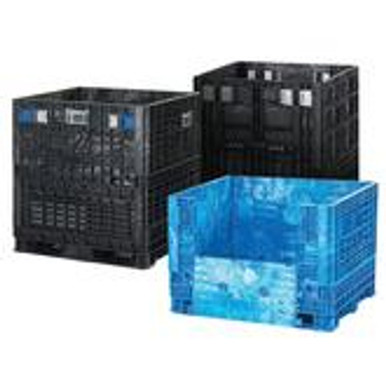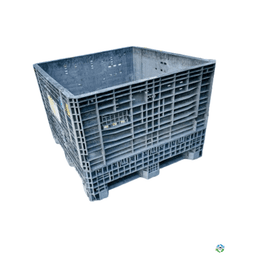The benefits of refurbished bulk containers in modern supply chain operations
Why Bulk Containers Are Crucial for Sustainable and Cost-Effective Transportation
Mass containers play an important duty in contemporary logistics. They facilitate the effective motion of big amounts of goods, thereby maximizing transportation procedures. This technique not just minimizes prices yet also decreases environmental effect with reduced discharges and waste generation. As markets seek more lasting methods, the fostering of bulk containers is coming to be progressively significant. What ramifications does this shift hold for future logistics and supply chain management?

The Benefits of Utilizing Mass Containers in Logistics
Bulk containers reinvent logistics by enhancing performance and sustainability. These containers permit the transport of big quantities of goods in a solitary journey, noticeably lowering the variety of trips called for. This not just enhances procedures however also minimizes labor prices connected with handling, filling, and dumping. In enhancement, bulk containers are designed to optimize room application within transportation automobiles, making certain that more items can be delivered concurrently.
The standardization of bulk containers likewise streamlines the logistics process. With uniform measurements, they can be easily stacked and kept, leading to improved storehouse administration. Mass containers commonly include durable products that protect contents from damages during transit, thus reducing product loss and raising overall reliability. Consequently, businesses can experience enhanced supply chain efficiency, ultimately bring about enhanced profitability and consumer fulfillment. This mix of elements makes bulk containers a vital possession in contemporary logistics.
Environmental Influence: Reducing Waste and Carbon Footprint
As industries increasingly prioritize sustainability, the adoption of mass containers has become a crucial method for lowering waste and lowering carbon footprints. These containers decrease using product packaging products, such as boxes and plastic, therefore significantly lowering general waste generation. By settling shipments, mass containers enhance transport effectiveness, permitting for more items to be transported per journey. This decrease in trips directly associates with reduced greenhouse gas exhausts, adding to a smaller carbon impact.
Additionally, mass containers can usually be reused or recycled, additionally mitigating environmental influence. The toughness of these containers warranties they can stand up to multiple transport cycles, lowering the requirement for single-use options. used collapsible bulk containers. By simplifying logistics and promoting efficient source use, bulk containers not just support sustainable practices yet additionally urge markets to straighten with international ecological goals. Inevitably, their implementation mirrors a commitment to eco-friendly stewardship and liable source monitoring
Expense Savings: How Bulk Containers Lower Transport Expenses
While many companies look for means to improve their profits, making use of mass containers offers a considerable chance for lowering transportation costs. Bulk containers make the most of the quantity of goods transported, permitting companies to deliver larger amounts simultaneously. This efficiency decreases the number of journeys needed, straight reducing fuel prices and minimizing labor expenses connected with loading and unloading.
In addition, mass containers frequently feature structured layouts that optimize area use within transport lorries. This means fewer vacant spaces, leading to more efficient usage of readily available ability. The toughness of bulk containers can lower the danger of item damage throughout transportation, lowering losses and guaranteeing that more products show up intact.
Enhancing Supply Chain Efficiency With Mass Storage Solutions
Mass storage space services play a necessary function in improving supply chain effectiveness by optimizing stock management. By settling items into fewer, bigger containers, businesses can considerably minimize handling prices related to regular transfers and processing. This streamlined strategy allows for far better tracking and monitoring of supply, inevitably bring about enhanced operational efficiency.
Structured Supply Management
Effective supply administration is essential for maximizing supply chain procedures, especially when companies take on bulk storage space remedies. These remedies enable businesses to maintain greater supply degrees while minimizing the frequency of replenishment. By settling materials into mass containers, companies can simplify their inventory processes, reducing the intricacy associated with tracking several smaller packages. This method assists in accurate inventory matters and improves projecting precision, enabling even more informed decision-making. In addition, mass storage services streamline storehouse company, making it simpler to situate and accessibility items when required. As an outcome, organizations can accomplish an extra efficient stock turn over price, eventually improving overall supply chain performance and reducing the likelihood of stockouts or overstock circumstances.

Decreased Handling Expenses
The execution of mass storage space services not only enhances supply monitoring but additionally substantially decreases managing prices across the supply chain. By consolidating products into bulk containers, companies minimize the requirement for constant handling and transfer in between various storage space and transportation systems. This method reduces labor expenses related to loading, dumping, and moving smaller packages. In addition, bulk storage reduces the regularity of shipments, leading to lower transport prices and decreased gas intake. Because of this, businesses can maximize their logistics procedures, enabling an extra efficient appropriation of sources. Eventually, decreased taking care of prices contribute to boosted general supply chain efficiency, fostering a setting that supports both sustainability and economic viability.

Adaptability of Bulk Containers Across Various Industries
Although several sectors have unique requirements for transport and storage space, mass containers have become a versatile solution that satisfies a large range of demands. These containers, ranging from large containers to specialized tanks, can accommodate varied materials, including fluids, granules, and powders. In the farming field, bulk containers promote the transport of grains and fertilizers, while the food and drink industry uses them for ingredients and finished items. The chemical market relies upon mass containers for securely transferring hazardous materials, making certain conformity with security regulations. Furthermore, building and construction companies gain from bulk containers for delivering aggregates and various other materials. Their adaptability encompasses various settings of transportation, consisting of ships, trucks, and trains, enhancing logistical performance. This convenience not only enhances operations throughout various fields but also advertises sustainability by lowering product packaging waste and enhancing space in transit. For that reason, mass containers play an important function in modern supply chain monitoring.
Future Patterns wholesale Container Usage and Sustainability
The future of mass container usage is significantly formed by cutting-edge materials growth that improves sustainability. Additionally, automation in logistics assures to improve procedures, lowering waste and enhancing efficiency. Embracing circular economy techniques will further change just how bulk containers are made, utilized, and reused, promoting an extra sustainable transport landscape.
Ingenious Products Development
As sectors progressively focus on sustainability, ingenious products growth wholesale containers arises as a substantial element in enhancing environmentally friendly transportation options. Scientists and manufacturers are exploring biodegradable plastics, recycled compounds, and light-weight steels to decrease ecological impact. These products not just reduce waste however likewise enhance gas efficiency by decreasing the overall weight of containers. Additionally, improvements in smart materials, which check that can adjust to differing problems, boost the toughness and performance of mass containers. The assimilation of these ingenious products aligns with circular economy concepts, promoting reuse and recycling. As the need for lasting techniques grows, the growth of such materials will certainly play a crucial function fit the future of mass container use in logistics and transportation.
Automation in Logistics
Substantial improvements in automation are poised to transform logistics and the application of bulk containers, boosting sustainability in transport. Automated systems, including drones and autonomous from this source vehicles, are improving the motion of bulk containers, lowering the reliance on traditional fuel-powered transportation. These modern technologies maximize directing and filling procedures, lessening empty miles and boosting fuel efficiency. Furthermore, automated inventory management systems enhance monitoring and monitoring of mass containers, making sure better resource appropriation and reduced waste. The assimilation of the Net of Things (IoT) permits real-time information evaluation, allowing aggressive decision-making that lines up with sustainability objectives. As automation proceeds to develop, it is expected to drive even more developments wholesale container use, inevitably supporting even more sustainable logistics methods and lowering the ecological effect of transport.
Round Economic Situation Practices
Advancements in automation are establishing the stage for a more integrated technique to circular economic situation practices in the domain of mass container usage. As industries significantly welcome sustainability, mass containers are being developed for long life and reusability. This change not just minimizes waste but additionally boosts resource efficiency. Firms are adopting techniques such as closed-loop systems, where utilized containers are accumulated, reconditioned, and reintroduced into the supply chain. Additionally, clever innovations track container life cycles, helping with much better management and lowering ecological influence. The collaboration between suppliers, logistics providers, and end-users is vital in establishing requirements for sustainable container usage. used collapsible containers. Future trends show a growing emphasis on materials that are recyclable and eco-friendly, further enhancing the circular economy's concepts in bulk transport

Often Asked Questions
What Materials Are Bulk Containers Normally Made From?
Mass containers are typically built from durable products such as high-density polyethylene, cardboard, steel, and aluminum. These products give toughness, protection, and flexibility, making them suitable for moving numerous items in different markets efficiently.
Just how Do I Pick the Right Size Mass Container?
Choosing the ideal dimension mass container includes assessing the volume of materials to be moved, thinking about taking care of devices compatibility, and appraising storage space requirements. Proper dimension warranties efficiency in transport and lessens waste during delivery.
Are Bulk Containers Reusable or Recyclable?
Bulk containers are commonly reusable, designed for numerous journeys, improving sustainability. Several can also be reused, relying on the materials utilized. Picking recyclable options better sustains environmental goals and reduces waste in transport practices.
What Security Laws Apply to Mass Container Transportation?
Security laws for bulk container transport include compliance with the Division of Transport guidelines, appropriate labeling of harmful materials, architectural integrity analyses, and adherence to weight limits to ensure safe handling and prevent crashes during transportation.
Exactly How Can Organizations Change to Making Use Of Bulk Containers Effectively?
Services can change to bulk containers by assessing existing logistics, educating staff on handling, buying appropriate tools, maximizing stock administration, and collaborating with distributors to assure compatibility and performance throughout the supply chain.
As industries significantly focus on sustainability, the fostering of bulk containers has actually emerged as a key pop over to these guys approach for reducing waste and reducing carbon footprints. By consolidating materials right into mass containers, companies can streamline their inventory procedures, minimizing the intricacy associated with tracking several smaller bundles. As industries progressively focus on sustainability, cutting-edge materials advancement in mass containers arises as a significant factor in improving green transport solutions. Automated systems, including drones and independent lorries, are streamlining the activity of mass containers, lowering the dependence on conventional fuel-powered transportation. In addition, automated stock administration systems boost monitoring and monitoring of mass containers, guaranteeing far better resource allotment and minimized waste.